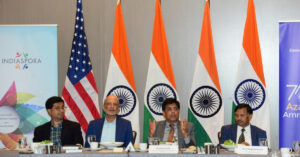The government is likely to provide more sops to new age sectors such as EV, clean energy, robotics, AI, electronics, battery storage, semiconductors, etc.
Automobiles, consumer, consumer durables and cement have been the most adversely impacted sectors
Countries like India may look at promoting their domestic manufacturing capabilities to de-risk themselves from the supply chain disruptions

To be at the safer side, India is likely to promote homegrown digital payment gateways such as UPI, RuPay and domestic ecommerce firms further, according to Motilal Oswal Institutional Equities report.
The brokerage firm in its report said that the central government is likely to move ahead with Production Linked Incentive (PLI) schemes and provide more sops and opportunities for companies to invest in new age areas such as electric vehicle (EV), clean energy (renewables and green hydrogen), robotics, artificial intelligence (AI), electronics, battery storage, semiconductors, among other areas.
Referring to the current tension between Russia and Ukraine, the brokerage firm said that it has directly or indirectly impacted most of the sectors from the perspective of demand and supply chain.
The impact on gross margins for these sectors would be substantial. On the other side, metals and oil and gas companies have been the direct beneficiaries due to rising prices in international markets, while indirect beneficiaries include export-oriented sectors, especially the IT sector which is benefiting from Rupee depreciation, and non-crude linked sectors.
The current sanctions on Russia may lead to a sharp strategic rethinking by countries on their trade and dependence on other countries. From a strategic point of view, more countries are likely to raise their defense spending since this emerges as the single biggest factor in heightened geopolitical situation.
Emerging markets have been adversely impacted by the risk-off stance and strengthening US dollar and these resulted in net foreign institutional investor (FII) outflows from most of the markets due to flight safety.
FIIs have sold $14.2 Bn (net) in equities in calendar year (CY)22 YTD, which is the highest in absolute terms.
More importantly, the pace of outflows has accelerated since CY22. After selling $5 Bn each in January 2022 and February 2022, FII outflows in the first nine days of March 2022 have crossed $4.5 Bn. With India running a twin deficit, high energy and commodity prices would weigh on its currency, the report said.
Meanwhile, Russia remains a vital global commodity supplier and accounts for nearly 17% of global natural gas production and 10% of global crude oil production.
In terms of its share in global minerals trade, Russia currently accounts for 9-10% of the global aluminum trade, 20% of thermal coal exports, 12% of global steel exports (ex-intra-regional trade), and 11-12% of global nickel exports.
While the current sanctions have disrupted the supply chain, it would be difficult from a global perspective to immediately find an alternative supplier. This will keep the prices elevated in the short run.
Government Push For UPI & RuPay Transactions
To promote the usage of homegrown modes of digital payments, the Cabinet in December last year approved a INR 1,300 Cr scheme to incentivise small merchants for charges levied on accepting transactions through RuPay debit cards and low-value UPI transactions. This charge is called Merchant Discount Rate (MDR).
The MDR is the fee that the shopkeeper pays to the card company. This fee is shared between the card-issuing bank, the bank that installs the point-of-sale machine and the card network.
Furthermore, UPI and RuPay debit cards fall under the government’s Zero-MDR norm that came into effect on January 1, 2020. It mandates that no fees should be levied on merchants for accepting consumer payments from these modes.
So, banks can increase issuance of RuPay debit cards and promote their use for payment transactions with the government approval.
The fees will also help smaller fintechs that were being squeezed out of the UPI race as they could not match the cash burn by multinational giants.
Meanwhile, to deploy UPI services in Nepal, NPCI International Payments Ltd (NIPL), the international arm of NPCI, has partnered with Gateway Payments Service (GPS) and Manam Infotech in February this year.
In 2021, UPI enabled 39 Bn financial transactions amounting to business worth $940 Bn, which is equivalent to around 31% of India’s GDP.









